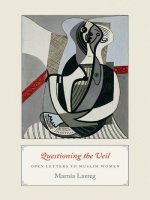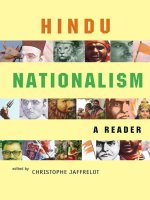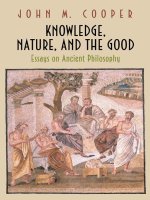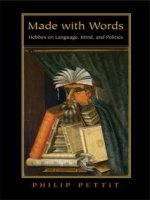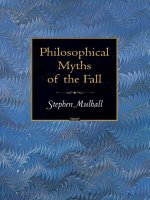princeton university press platos democratic entanglements may 2000
Bạn đang xem bản rút gọn của tài liệu. Xem và tải ngay bản đầy đủ của tài liệu tại đây (1.98 MB, 265 trang )
Plato’s Democratic Entanglements
This page intentionally left blank
Plato’s Democratic
Entanglements
ATHENIAN POLITICS AND
THE PR ACTICE OF PHILOSOPHY
S. Sara Monoson
PRINCETON UNIVERSITY PRESS
PRINCETON , NEW JERSEY
Copyright 2000 by Princeton University Press
Published by Princeton University Press, 41 William Street,
Princeton, New Jersey 08540
In the United Kingdom: Princeton University Press,
Chichester, West Sussex
All Rights Reserved
Library of Congress Cataloging-in-Publication Data
Monoson, Susan Sara, 1960–
Plato’s democratic entanglements : Athenian politics and the practice
of philosophy / S. Sara Monoson
p.
cm.
Includes bibliographical references and index.
ISBN 0-691-04366-3 (cloth : alk. paper)
1. Democracy—Greece—Athens—History. 2. Plato—
Views on democracy. I. Title
JC75.D36 M65 2000
320.438′5—dc21
99-054924
This book has been composed in Adobe Galliard
The paper used in this publication meets the minimum requirements
of ANSI/NISO Z39.48-1992 (R1997) (Permanence of Paper)
www.pup.princeton.edu
Printed in the United States of America
1 3 5 7 9 10 8 6 4 2
For Mimi and David Monoson,
my wonderful parents
This page intentionally left blank
CONTENTS
Acknowledgments
ix
INTRODUCTION
Siting Plato
3
PART ONE: Aspects of the Athenian Civic
Self-Image
19
CHAPTER ONE
The Allure of Harmodius and Aristogeiton: Public/Private
Relations in the Athenian Democratic Imaginary
Telling the Tale
Embracing the Simplified Tale
Thinking with the Tale
Thucydides’ Critique
Aristotle’s Critique
21
22
28
29
42
49
CHAPTER TWO
Citizen as Parrhesiastes (Frank Speaker)
¯
¯
51
Truth-Telling and Risk-Taking
Frank Speaking and Freedom
Frank Speaking and the Integrity of Assembly Debate
52
54
56
CHAPTER THREE
Citizen as Erastes (Lover): Erotic Imagery and the Idea of
¯
Reciprocity in the Periclean Funeral Oration
Citizen as Erastes
¯
Citizenship as Reciprocity between Lover and Beloved
64
67
74
CHAPTER FOUR
Citizen as Theates (Theater-Goer): Performing Unity,
¯
Reciprocity, and Strong-Mindedness in the City Dionysia
The Event
Representing the Unity of the Democratic Polis
Enacting Democratic Norms
88
90
92
98
viii
CONTENTS
PART TWO: Plato’s Democratic
Entanglements
111
CHAPTER FIVE
Unsettling the Orthodoxy
Philosopher as Tyrant-Slayer
The Matter of Bias
Dismay over the Fate of Socrates
Disdain for the Common Man
The “Doctrine” of the Republic
The Work of the Academy
Personal Involvement in Syracusan Politics
113
113
115
118
122
125
137
145
CHAPTER SIX
Philosopher as Parrhesiastes (Frank Speaker)
¯
¯
The Laches: Recognizing Parrhesia
¯
The Gorgias: Embracing Parrhesia
¯
The Republic: Practicing Parrhesia
¯
The Laws: Practicing Parrhesia
¯
154
155
161
165
179
CHAPTER SEVEN
Remembering Pericles: The Political and Theoretical Import
of Plato’s Menexenus
Plato’s Opposition to the Veneration of Pericles
Plato’s Rejection of Pericles’ Model of Democratic Citizenship
Plato’s Theoretical Interest in Funeral Oratory
181
182
189
202
CHAPTER EIGHT
Theory and Theatricality
206
A Puzzle
Four Patterns
Preliminary Thoughts on Theory and Theater-going
Philosopher as Theates in the Republic
¯
Theorist as Theoros in the Laws
¯
Why Is Socrates Absent from the Laws?
Concluding Remarks
206
207
208
212
226
232
237
Citation Index
239
General Index
245
ACKNOWLEDGMENTS
I OFFER an interpretation of Plato that aims to expose his forging of a
serious, though limited, alliance between the practice of philosophy and
Athenian democratic politics. This project may seem preposterous to
some, intriguing to others, long overdue to others still. I have tried to
write with this diverse and multidisciplinary readership in mind.
My approach is contextual. I juxtapose Plato’s depictions of intellectual
labor with contemporaneous demotic forms of civic discourse and the
democratic ideals celebrated therein. In so doing, I engage work in Greek
historiography and literature by classicists as well as recent scholarship on
Plato’s political thought by theorists and philosophers.
I have relied on Oxford Classical Texts (Oxford: Clarendon) for the
Greek text of material cited. I have also regularly consulted the following
commentaries: James Adam, The Republic of Plato, Edited with Critical
Notes, Commentary and Appendices, 2 vols., 2d ed. (Cambridge: Cambridge University Press, 1963); E. R. Dodds, Plato. Gorgias. A Revised
Text with Introduction and Commentary (Oxford: Clarendon, 1959);
A. W. Gomme, A Historical Commentary on Thucydides, 5 vols. (vols. 4
and 5 by A. W. Gomme, A. Andrewes, and K. J. Dover) (Oxford:
Clarendon, 1950–81); and P. J. Rhodes, Thucydides Book 2, Edited Greek
Text, Translation and Commentary (Warmister: Aris and Philips, 1988).
All Greek cited has been transliterated. Note that I have employed ch for
chi, x for xi, ph for phi, u for upsilon, ¯ for eta, ¯ for omega, and i for iota
e
o
subscript. In the case of well-known names, however, I have retained the
customary Latinized spelling (e.g., Socrates, not Sokrates). Unless otherwise noted, translations cited are or derive from the following editions:
Allan Bloom, The Republic of Plato. Translation with Notes and Interpretive Essay (New York: Basic, 1968); Terence Irwin, Plato. Gorgias (Oxford:
Clarendon, 1979); R. E. Allen, “Plato’s Menexenus,” in his The Dialogues
of Plato, vol. 1 (New Haven: Yale University Press, 1985), pp. 315–43;
Thomas Pangle, The Laws of Plato. Translated, with Notes and an Interpretive Essay (New York: Basic, 1980). The remaining texts of Plato cited are
from, or are adapted from, those collected in John M. Cooper, ed., Plato:
Complete Works, (Indianapolis, Ind.: Hackett, 1997). Translations from
Thucydides are from Robert B. Strassler, ed., The Landmark Thucydides:
A Revised Edition of the Richard Crawley Translation (New York: Free
Press, 1996). Translations from Aristotle’s Constitution of Athens are from
Kurt von Fritz and Ernst Kapp, Aristotle’s Constitution of Athens and Re-
x
ACKNOWLEDGMENTS
lated Texts. Translated with an Introduction and Notes (New York: Haffner,
1974). Editions of other texts are identified in the notes.
This book began as a doctoral dissertation in the Program in Political
Philosophy and Department of Politics at Princeton University. It was my
great good fortune to work under the supervision of W. Robert Connor,
George Kateb, and Alan Ryan, and to have J. Peter Euben as my outside
reader. These teachers, now also friends, have shaped my thinking with
probing questions and insightful comments. Each one has my enduring
gratitude for his generosity and many kindnesses.
Many other individuals have helped me develop the ideas presented here
by offering candid comments on earlier drafts of portions of this work. I
have benefited from the exacting standards of Richard Dagger, Tracy
Davis, Jill Frank, Bonnie Honig, Richard Kraut, Jenny Mansbridge, Gerald Mara, Susan Moller Okin, Arlene Saxonhouse, Stephen Salkever, Keith
Topper, Pierre Vidal-Naquet, and Robert Wallace. Panelists and audiences
at meetings of the American Political Science Association, Western Political Science Association, and Northeastern Political Science Association,
where I presented various portions of this book over the past few years,
were also helpful, as were fellow participants at the conference “Democracy and Tyranny in Archaic and Classical Greece” at Northwestern University in April 1999. My thanks also to my research assistant, Ella Myers,
for her help in proofreading the entire manuscript.
It has also been a pleasure to work with Princeton University Press. For
their thoughtful and gracious help at various stages in the preparation of
this book, my warm thanks to my editor, Ann Wald, to her assistants, and
to Sherry Wert, Jeffrey Carnes, Ian Malcolm, and Karen Verde.
Many colleagues and friends in and out of the Department of Political
Science at Northwestern University have been a delight as I have labored
to get the book out. My warm thanks in particular to Susan Herbst and
the network of women colleagues on whom I have come to rely for frank
talk and good cheer. I also recall with pleasure my two years on the faculty
in the Department of Political Science at Arizona State University.
Two fellowships provided support at crucial moments in the development of this project. Most recently, I was a Junior Faculty Fellow in the
Alice Berline Kaplan Center for the Humanities in Northwestern University. Some years earlier I received a Charlotte Newcombe Dissertation Year
Fellowship.
Parts of various chapters have appeared in print: “Frank Speech, Democracy and Philosophy: Plato’s Debt to a Democratic Strategy of Civic
Discourse,” in Athenian Political Thought and the Reconstruction of American Democracy, ed. J. Peter Euben, Josiah Ober, and John Wallach (Ithaca: Cornell University Press, 1994), pp. 172–97, copyright (c) 1994 by
Cornell University; “Citizen as Erastes: Erotic Imagery and the Idea of
¯
ACKNOWLEDGMENTS
xi
Reciprocity in the Periclean Funeral Oration,” Political Theory 22, no. 2
(1994): 253–76, copyright (c) 1994 by Sage Publications; “Remembering
Pericles: The Political and Theoretical Import of Plato’s Menexenus,” Political Theory 26, no. 4 (1998): 489–513, copyright (c) 1998 by Sage Publications, reprinted by permission.
I have lived with this book for some time and, though in a different
way, so has my extended family. All the Monosons, Hochmans, and Grossmans—and in particular, Seth, Jill and Pauline—have displayed an infectious confidence in me that has been a key source of strength. Old friends,
too, have sustained me in my labors. In particular, Barrie Place and Vicky
Stone have my warmest thanks. To my beloved Michael Berns, whom I
met as I was preparing to move to Evanston and who joined me there a
few months later, thank you for your patience. To my adored Alexander,
know that you inspired my choice of cover art. I have reserved expression
of my greatest debt for the dedication.
This page intentionally left blank
Plato’s Democratic Entanglements
This page intentionally left blank
Introduction
SITING PLATO
IN THIS BOOK I argue for a fundamental rethinking of the relationship
between Plato’s thought and the practice of democracy. I propose that the
canonical view of Plato as a virulent antidemocrat is not sound.1 Rather,
in his work, a searching consideration of the possibilities raised by some
democratic ideals and institutions coexists alongside severe criticisms of
democratic life and politics. Plato finds the lived experience and ideology
of Athenian democracy repulsive and fascinating, troubling and intriguing. He not only assails democratic practice but also weaves hesitations
about the reach of that attack into the very presentation of his thought.
A substantial measure of ambivalence, not unequivocal hostility, marks his
attitude toward democracy as he knew it.
This dimension of Plato’s thought has remained largely unexplored for
some time. This is in part because Plato has for centuries been cast as a
founding figure in what has been called the “antidemocratic tradition in
Western thought.”2 But even when commentators have noted that state1
This view is longstanding and widely held, and thus I call it canonical. Typical are passages such as the following: “Plato’s antipathy to democracy as he knew it thus emerges
clearly in this section [the simile of the ship at Republic 487b–497a]. No doubt his antidemocratic attitude is a product of various complex factors, but what should interest us here
is the philosophical ground for his condemnation of democracy” (R. C. Cross and A. D.
Woozley, Plato’s Republic: A Philosophical Commentary [London: Macmillan, 1964], p.
198); “The very notion of democracy has always provided a field day for critics. Critics are
roughly of three kinds: those fundamentally opposed to democracy because, like Plato, they
believe that while it may be possible it is inherently undesirable . . .” (Robert Dahl, Democracy and Its Critics [New Haven: Yale University Press, 1989], p. 2); and, “Plato was antidemocratic in the highest degree” (G.E.M. de Ste. Croix, The Class Struggle in the Ancient
Greek World [London: Duckworth, 1981], p. 71). A notable exception is Ernest Barker,
Greek Political Theory: Plato and His Predecessors (New York: Methuen, 1918). He writes
that although Plato is a “bitter critic of Periclean democracy . . . he can also do justice to its
better side even in the Republic” (p. 126, see also p. 299).
2
Jennifer Tolbert Roberts, Athens on Trial: The Antidemocratic Tradition in Western
Thought (Princeton: Princeton University Press, 1994). Roberts finds that “the subtleties
[of Plato’s thought on democracy] have not been incorporated into the tradition on Plato,
Socrates and Athenian democracy” (p. 75), noting that the “indictment of democracy
that appears in Plato’s dialogues . . . was to become an integral part of the antidemocratic tradition and was to be cited by later writers as evidence of the insufficiency both of
Athenian government in particular and of democracy in general. In this tradition, Plato’s
forceful attacks on oligarchy were generally ignored” (p. 82). Nevertheless, and despite expressing these words of caution, Roberts herself goes on to speak of Plato’s clear “opposition
4
INTRODUCTION
ments sympathetic to democracy appear in the dialogues, they typically
treat them as anomalous. The most well-known is the passage in the Statesman where Socrates is made to identify democracy as preferable to any
other regime likely to exist (303a–c), a view Plato repeats in Letter 7
(342d8–10).3 But such passages are not momentary irregularities. They
are part of a sustained pattern of interest in democracy that runs through
the entire corpus. To see this, however, we need to read Plato in the context of contemporaneous understandings of democratic political ideals and
practices.4 We need, that is, to be alert to the way Plato mobilizes the
language, imagery, and principles that the Athenians themselves used to
fashion their orthodox civic self-understanding. Familiarity with the variety of images and topics that were culturally available to Plato as he crafted
his written works is crucial to understanding his commentary on democracy. Once we gain such familiarity, we can more readily see that he does
not mount an enemy attack on Athenian democracy, nor does he oppose
it totally. Instead, we see that Plato’s dialogues contain explicit, albeit qualified, expressions of acceptance of the wide dispersal of political power
characteristic of democracy, enlist certain celebrated Athenian democratic
principles in the design of his critique of democratic politics, and depict
the practice of philosophy as indebted to Athenian democratic culture.
Plato indicates that philosophy needs to appropriate some, though certainly not all, of democracy’s values.
Situating Plato in the context of the Athenian civic self-image raises
some theoretical and methodological issues. The literary record of classical
Greece does not include a systematic discussion of the merits and nature
of Athenian democracy composed by someone of democratic sympathies.
Substantial narrative accounts of “what the democrats think” are embedded in the work of Plato and other critics (e.g., Aristotle, the “Old Oligarch”). We obviously cannot use Plato’s account of democratic thought
as evidence for a new context within which to situate a reading of his
treatment of democracy. Nor can we rely on accounts present in the work
of other critics without independent evidence from less problematic
sources. In addition, though there are explicit, favorable reviews of demoto democracy” (e.g., p. 84) and does not hesitate labeling him an “antidemocratic thinker”
(p. 95).
3
Commenting on Statesman 303a, for example, George Klosko writes, “This sort of reasoning is alien to Plato’s earlier works.” See The Development of Plato’s Political Thought
(New York: Methuen, 1986), p. 196.
4
On the terminology of “practices” and practice theory, see Sherry B. Ortner, Making
Gender: The Politics and Erotics of Culture (Boston: Beacon Press, 1996). Also see Pierre
Bourdieu, Outline of a Theory of Practice, trans. Richard Nice (Cambridge: Cambridge University Press, 1978 [1972]).
SITING PLATO
5
cratic ideas in drama, oratory, and historical writings, these amount only
to occasional, brief arguments in support of particular institutions or practices, or the expression of certain generalizations and maxims about the
benefits of democracy. Some scholars have made exceptional use of this
evidence to add texture to our understanding of the functioning of particular Athenian political institutions, including the courts and Assembly.5
Others have focused on examining such things as the emergence of the
term demokratia and the peculiar meanings of Athenian ideas of freedom,
¯
equality, and law (eleutheria, isonomia, and nomos).6 Others still have attempted to reconstruct a lost systematic democratic theory from this disparate evidence.7 These scholars are motivated by an admirable concern
to demonstrate that among the intellectual products of Greek antiquity
was not only fierce criticism of democracy but a sound defense of its basic
structure and principles. Unfortunately, these works are often marred by
5
For example, Moses Finley, Democracy Ancient and Modern (New Brunswick, N.J.:
Rutgers University Press, 1973), Politics in the Ancient World (New York: Cambridge University Press, 1983). Arlene Saxonhouse in Athenian Democracy: Modern Mythmakers and
Ancient Theorists (Notre Dame, Ind.: University of Notre Dame Press, 1996), turns to the
work of historical and philosophical writers of antiquity to improve our understanding of
the institutions of Athenian democracy. On the structure and mechanics of Athenian institutions, see Mogens Herman Hansen, The Athenian Democracy in the Age of Demosthenes:
Structure, Principles and Ideology (Oxford: Blackwell, 1991), which also contains a useful
bibliography.
6
For a representative selection of recent work in this area, see the essays collected as Part
One in “Liberty, Equality and Law,” in Demokratia: A Conversation on Democracies, Ancient
¯
and Modern, ed. Josiah Ober and Charles Hedrick (Princeton: Princeton University Press,
1996), which also contains a useful bibliography. Also see L. Foxhall and A.D.E. Lewis, eds.,
Greek Law in Its Political Setting: Justification Not Justice (Oxford: Clarendon, 1996); John
A. Koumoulides, ed., The Good Idea: Democracy and Ancient Greece (New Rochelle, N.Y.:
Aristide D. Caratzas, 1995); Martin Ostwald, From Popular Sovereignty to the Sovereignty of
Law: Law, Society and Politics in Fifth-Century Athens (Berkeley: University of California
Press, 1986); Martin Ostwald, Nomos and the Beginnings of Athenian Democracy (Oxford:
Clarendon, 1969); John Dunn, ed., Democracy: The Unfinished Journey, 508 B.C. to A.D.
1993 (Oxford: Oxford University Press, 1992); Orlando Patterson, Freedom: Freedom in the
Making of Western Culture (New York: Basic, 1991); and David Stockton, The Classical
Athenian Democracy (New York: Oxford University Press, 1990); Lisa Kallet-Marx, “Institutions, Ideology, and Political Consciousness in Ancient Greece: Some Recent Books on
Athenian Democracy,” Journal of the History of Ideas 55 (1994): 309–35; V. Ehrenberg,
“Origins of Democracy,” Historia 1 (1950): 515–48; M. H. Hansen, “The Origin of the
Term Demokratia,” Liverpool Classical Monthly 11 (1986): 35–36; G. Vlastos, “Isonomia,”
¯
American Journal of Philology 74 (1954): 333–66, and “Isonomia Politike,” in his Platonic
¯
Studies, 2d ed. (Princeton: Princeton University Press, 1981), pp. 164–203.
7
A.H.M. Jones, Athenian Democracy (Baltimore: The Johns Hopkins University Press,
1957); Eric Havelock, The Liberal Temper in Greek Politics (New Haven, Conn.: Yale University Press, 1957); Cynthia Farrar, The Origins of Democratic Thinking (New York: Cambridge
University Press, 1989).
6
INTRODUCTION
an overinterpretation of fragmentary and dubiously situated evidence that
is finally unacceptable, regardless of how clever—even ingenious—these
analyses may be at times.8
I turn to wider cultural resources for expressions of Athenian democratic thought. Specifically, I look to civic ritual performances, oral traditions, popular legends, and other Athenian cultural practices. It is wrong
to assume that the absence of a systematic work of democratic theory in
the extant literary record of ancient Athens is just our bad luck and to
consider our project today to be the recovery of the tenets of such a lost
treatise. Rather, it is important to recognize that it is quite possible that
the Athenians did not write an elaborate statement of democratic theory
but “enacted it.”9 Our challenge is to identify the occasions on which
the Athenians experientially engaged important aspects of their civic selfunderstanding and to develop methods of analysis capable of drawing accounts of that civic self-image out of our sources.
Investigating the Athenian civic self-image involves some reconceptualization of what we ordinarily mean by “Athenian democracy.” The Athenians did not consider “democracy” to be a matter of the polis having in
place certain governing institutions (though of course it was certainly
this in part). For the Athenians, democratic citizenship not only involved
participating in some capacity in the work of the Assembly, courts, Council, and military, it was also a matter of the ritualized performance of a
cluster of cultural practices that reach into both private and public life. It
included the way in which the city ordered the tending of sacred matters,
physical exercise, athletic competition, poetic production and experience,
burial of the dead, possession and distribution of property, acquisition
and maintenance of prestige, education of children, sexual behavior, military training and service, and deliberation on public affairs. Commentators routinely acknowledge this expanded understanding of Athenian democracy when they note how inadequately the Greek word politeia
translates “constitution.” A city’s politeia encompasses not only its organization of legislative, judicial, and administrative authority but also the
8
On the unreliability of these studies, see Josiah Ober, Mass and Elite in Democratic
Athens: Rhetoric, Ideology and the Power of the People (Princeton: Princeton University Press,
1989), p. 38.
9
W. Robert Connor, “Civil Society, Dionysiac Festival and the Athenian Democracy,” in
Ober and Hedrick, eds., Demokratia, p. 224. On the conspicuous absence of any record of
¯
formal democratic theorizing in ancient Athens, also see Josiah Ober, The Athenian Revolution: Essays on Ancient Greek Democracy and Political Theory (Princeton: Princeton University Press, 1996), pp. 147–48. He stresses that “in Athens democratic ideology so dominated
the political landscape that formal democratic theory was otiose” (p. 148). On democratic
thought (in contrast to systematic theorizing) of the period, see Kurt A. Raaflaub, “Contemporary Perceptions of Democracy in Fifth-Century Athens,” Classica et mediaevalia 40
(1989): 33–70.
SITING PLATO
7
patterns of life and ideology that distinguish its civic culture.10 This is
abundantly clear in our sources. For instance, Pericles in his funeral oration attributes Athens’ greatness to its democracy, which, he goes on to
explain, refers not only to the city’s form of government but also to its
pervasive patterns of life.11
We might think the democratic significance of these cultural activities
lies in their capacity to equip citizens for the more straightforwardly political work they perform in such arenas as the Assembly, courts, and Council.
For example, the production of tragedy on a grand civic festival occasion
provided theater-going citizens with an opportunity to hone intellectual
skills that would be valuable when conducting policy deliberations and
making decisions in the Assembly, courts, and Council.12 But while we
observe this connection, we must also recognize that to the Athenians,
such cultural practices were in themselves part of the conduct of democratic life and not strictly ways to prepare oneself for the (more) real work
of governing. Traversing civic space, participating in particular ways in a
procession or public sacrifice, attending the theater, heading a household,
performing the dithyramb, acting in a chorus, as well as many other activities were all strands of a web of practices through which eligible individuals experienced their Athenian democratic citizenship.13
These practices as well as more traditionally political forms of participation in civic life involved citizens in enacting a sort of official public perception of Athenian democracy’s character and excellence. This perception
was certainly not neutral toward the various citizen and noncitizen populations of the Athenian polis. Rather, it presented the city as a unity, wishfully ignoring or fancifully resolving serious social tensions that plagued
the polis. Alert to this dimension of the self-image the Athenian projected
10
Josiah Ober argues that politeia must include ideology, offering a persuasive reading of
passages from Aristotle in the process. See The Athenian Revolution, p. 173. On Aristotle
and a broader, practice-based understanding of democracy, see Jill Frank, “Democracy and
Distribution: Aristotle on Just Desert,” Political Theory 26, no. 6 (1998): 784–802. For
discussion of politeia and “forms of society,” see Claude Lefort, Democracy and Political
Theory (Minneapolis: University of Minnesota Press, 1988), pp. 2–3.
11
Thucydides 2.36.4–42.1. Thucydides develops a critique of this typically Athenian, expansive way of conceiving the scope of collective activities that can properly be considered
“political.” His account of the war employs a narrower conception of the boundaries of the
political. Indeed, his text is one of the first to identify political activity exclusively with governing and military matters.
12
See, for example, J. Peter Euben, “Introduction,” in Greek Tragedy and Political Theory
(Princeton: Princeton University Press, 1986); and Christian Meier, The Political Art of
Greek Tragedy (Baltimore: The Johns Hopkins University Press, 1993).
13
See Pauline Schmidtt-Pantel, “Collective Activities and the Political in the Greek
City,” in The Greek City, ed. Oswyn Murray and Simon Price (Oxford: Clarendon, 1990),
pp. 199–214.
8
INTRODUCTION
in the context of performing these activities, I call attention to its partial
and at times oppressive character. But my central concern is to interpret a
set of practices through which the Athenian demos, itself an exclusive
¯
group, fashioned a public presentation of its own understanding of the
“fragment of reality” in which its members lived.14 I examine what the
dominant elements in the democratic polis found politically useful to publicize about itself. The dominant elements were citizens—freeborn native
males of mature age who could participate fully in political life. But the
demos was not a homogenous group. It was beset by class, regional, age,
and clan conflicts, and so sometimes dominant elements will be subsets
of the citizen population.
We must, of course, recognize that the Athenian democratic order practiced—and celebrated—gender inequality, xenophobia, imperialism, and
slavery. But doing so does not require us to deny that the idea and practice
of democracy was an invention of the Greek polis. It was at this historical
moment that there emerged both the idea that all citizens, regardless of
differences of wealth, birth, talents, trade, or profession, should be political equals and a stable set of practices that effectively placed power in the
hands of the common (nonelite) mass of citizens. Despite its many shortcomings, it is the case that, as Geoffrey de Ste. Croix stressed, democracy
is “the brilliant achievement of the Greek polis: the Greek polis . . . had
to build it up from the very bottom; . . . had both to devise the necessary
institutions and to construct an appropriate ideology.”15 My focus in the
chapters on Athenian democratic thought is not the extent to which the
Athenian democratic order materially depended upon the more disturbing
features of Athenian life that accompanied it but how the dominant ele14
I have borrowed this phrasing from Lydia Cochrane’s translation of Roger Chartier,
Cultural History: Between Practices and Representations (Ithaca: Cornell University Press,
1988), p. 5.
15
Ste. Croix, The Class Struggle in the Ancient World, p. 281. See also Pierre Vidal-Naquet,
´ ˆ
´ ˆ
Cornelius Castoriadis, and Pierre Leveque, “On the Invention of Democracy,” in Leveque
and Vidal-Naquet, Cleisthenes the Athenian, trans. David Ames Curtis (Atlantic Highlands,
N.J.: Humanities Press, 1996 [1964]), pp. 100–135; Ober and Hedrick, eds., Demokratia;
¯
Euben, Ober, and Wallach, eds., Athenian Political Thought and the Reconstitution of American Democracy; Morris and Raaflaub, eds., Democracy 2500?; Bernard Gofmann, Sheldon S.
Wolin, J. Peter Euben, Josiah Ober, Arlene Saxonhouse, and Michael T. Clark, “The 2500th
Anniversary of Democracy: Lessons of Athenian Democracy,” PS: Political Science and Politics 26, no. 3 (Sept. 1993): 471–94. On the nature of democracy at Athens, see Ober, who
argues that Athenians sustained rule by the people because “the ordinary citizen . . . was a
participant in maintaining a political culture and a value system that constituted him the
political equal of his elite neighbor” (The Athenian Revolution, p. 154). On the manner in
which the ordinary citizen wielded power and the nature of the democratic hegemony at
Athens, see Ober, Mass and Elite, and the useful summary in Political Dissent in Democratic
Athens: Intellectual Critics of Popular Rule (Princeton: Princeton University Press, 1998),
p. 31.
SITING PLATO
9
ments in the polis mobilized the available meanings associated with various groups and practices to craft a patriotic civic self-image, that is, to
celebrate the achievement of democracy.16
This book has two parts. Part One examines aspects of Athenian democratic thought, focusing on the structure of the Athenian democratic
imaginary (wishful self-image). Part Two turns to the interpretation of
the dialogues of Plato. This strategy of presentation stresses that a new
reading of Plato’s treatment of democracy becomes possible only once
features of the Athenian civic self-image are juxtaposed with Plato’s account of philosophical practice.
In Part One, I employ an approach to Athenian democratic thought
that builds on a growing literature in classics and political theory that
considers Athenian political life fluidly to reach beyond the functioning
of specific traditional political institutions. For example, I draw on the
extensive work on such topics as the civic context of Athenian drama, the
civic ideals that animate festival events and ritual practices unique to
Athens (City Dionysia, funeral oration), the meanings of the myths that
pervade Athenian political discourse, the character and reach of the power
of the ordinary people in the Athenian polis, the gendered nature of
Athenian political life, and the political dimension of Athenian erotic life.
These chapters contribute to the literature on Athenian politics from the
vantage point of political theory. That is, these chapters extend the findings of classicists in theoretical directions and, in doing so, raise the possibility that we can track Plato’s interest in Athenian politics at the level of
theory—the task to which I turn in Part Two.
The strategy of reading Plato I develop in Part Two builds upon five
strands of recent Plato scholarship. First, work tracing the roots of the
new genre of writing Plato develops, philosophic dialogue, in Athenian
drama (specifically tragedy) supports my efforts to unsettle the common
view that Plato’s thought is at war with the Athenian democratic tradition.
Such work shows, for example, that “Plato’s debt to theater is not a debt
to some arbitrary aesthetic invention but to the social institutions of his
culture, which means that his attitude toward tragedy is a way of locating
him in the intellectual traditions and political practices that defined
Athenian democracy.”17
16
For discussion of various recent studies that aim to characterize Athenian democracy,
see Lisa Kallet-Marx, “Institutions, Ideology and Political Consciousness.” Also see Robert
Browning, “How Democratic Was Ancient Athens?” in Koumoulides, ed., The Good Idea,
pp. 57–70; and Robin Osborne, “Athenian Democracy: Something to Celebrate?” Dialogos
1 (1994): 48–58.
17
J. Peter Euben, The Tragedy of Political Theory (Princeton: Princeton University Press,
1990), p. 236. Also Martha Nussbaum, The Fragility of Goodness: Luck and Ethics in Greek
Tragedy and Philosophy (Cambridge: Cambridge University Press, 1986), pp. 122–35.
10
INTRODUCTION
Second, the compelling body of literature on why Plato wrote dialogues
also supports my view that defining aspects of Plato’s thought have roots
in Athenian democratic practices. This work demonstrates that the dialogic form has deep philosophic import. It is not simply a clever way to
express a doctrine that could have been more easily stated in systematic
exposition, but a mode of writing that allows Plato to craft for the reader
the unusual experience of philosophic inquiry and dramatize both its departures from and attachments to Athenian traditions.18
Third, the few historical studies of Plato that exist have demonstrated
that he was deeply engaged with the politics of his city. Glenn Morrow’s
historical interpretation of the Laws shows that Plato was fully conversant
with the minutiae of Athenian politics and concerned not simply to denounce democracy but to explore the possibilities that inhere in some
specifically democratic structures and practices.19 Pierre Vidal-Naquet
shows how imbedded in Plato’s thought are structures of Athenian political discourse. His essays on the myths of Atlantis in the Timaeus and Critias and of a Golden Age in the Statesman detail how Plato’s thought not
only opposes certain practices of Athenian democracy but also simultaneously explores the possibilities that attend its political life.20 Most recently,
Josiah Ober has placed Plato’s philosophical project in the context of
Athenian elites’ efforts to “reinvent political dissent” at Athens after practical attempts to bring about change failed miserably (i.e., generated the
rule of the Thirty).21 He proposes that a desire to find new grounds for
18
Andrea Nightingale examines “Platonic intertexuality” in relation to Plato’s efforts to
define the boundaries of philosophy as a discursive and social practice in Genres in Dialogue:
Plato and the Construct of Philosophy (Cambridge: Cambridge University Press, 1995). Also
on the philosophical import of the dialogic form, see Charles Griswold, ed., Platonic Writings/Platonic Readings (New York: Routledge, 1988); J. C. Klagge and Nicholas D. Smith,
eds., Methods of Interpreting Plato: Oxford Studies in Ancient Philosophy (Oxford: Clarendon,
1992); Gerald A. Press, Plato’s Dialogues: New Studies and Interpretations (Lanham, Md.:
Rowman and Littlefield, 1993); and Charles H. Kahn, Plato and the Socratic Dialogue: The
Philosophical Use of a Literary Form (Cambridge: Cambridge University Press, 1996).
19
Glenn Morrow, Plato’s Cretan City: An Historical Commentary on the Laws, (Princeton:
Princeton University Press, 1993 [1960]).
20
Pierre Vidal-Naquet, “Athens and Atlantis: Structure and Meaning of a Platonic
Myth,” and “Plato’s Myth of the Statesman, the Ambiguities of the Golden Age and of
History,” in The Black Hunter: Forms of Thought and Forms of Society in the Greek World,
trans. Andrew Szegedy-Maszak (Baltimore: The Johns Hopkins University Press, 1986), pp.
263–301. Also see his “A Study of Ambiguity: Artisans in the Platonic City,” in The Black
Hunter, pp. 224–48.
21
Ober, Political Dissent, p. 5. Other historical studies of Plato include Michael Morgan,
Platonic Piety: Philosophy and Ritual in Fourth-Century Athens (New Haven: Yale University
Press, 1990); and Harvey Yunis, Taming Democracy: Models of Political Rhetoric in Classical
Athens (Ithaca: Cornell University Press, 1996). Morgan finds important continuities between the practices of the Athenian democratic polis and the structure of Plato’s thought.
SITING PLATO
11
explaining what was wrong with rule of the people motivates Plato’s work.
In so doing, he offers an account of Plato’s serious critique of democracy,
but he also observes that Plato at times utilizes the language and imagery
of Athenian democratic practices to articulate these views.22
The fourth strand of recent work with which this study stands in conversation are the several efforts to consider the complexities of the relationship between Socrates and Athenian democracy. This work includes
assessments of the evidence for the attitudes of the historical Socrates as
well as consideration of links between Plato’s depiction of Socrates and
democratic ideals and practices of his time.23 In this book I focus squarely
Yunis places Plato’s critique of democracy in the context of contemporaneous writers’ concerns with rhetoric and leadership.
22
Ober occasionally acknowledges the constructive impact of Athenian political culture
on Plato’s thought (Political Dissent, pp. 49, 158, 247, 281, 370–72), despite characterizing
Plato as engaging in an “epic rejection of Athenian political culture” and, he implies, as
betraying Socrates, who he takes to have been an “immanent social critic” (p. 213). For
example, Ober details how Plato’s “imaginative attempt to solve his ‘Socrates and Athens’
problem . . . [makes use of] exactly the performative, speech-act method characteristic of the
democracy: vigorous, open debate conducted according to accepted protocols among persons who regarded one another as equals; followed by a resolution for action by the assembled company” (p. 247). But he seems content for such observations to suggest little more
than Plato’s recognition of the fact that “to inhabit the public domain of the democratic
polis is to be affected by and borrow from the language, procedures, and assumptions of the
demos” (p. 214). I find these aspects of Plato’s work far more significant. They are part of
what I argue is a pattern of interest in the possibilities raised by democratic hegemony and
the development of certain practices in democratic Athens. The relation of my project to
Ober’s assessment of Plato in Political Dissent may be clarified further. He refers to his work
as an effort to track how theorists, including Plato, describe “alternative visions of consensual
and noncoercive—yet nondemocratic—political societies” (p. 5). I focus on the continuity
between democratic innovations at Athens and the “consensual and noncoercive” features
of the tradition Ober sees Plato embracing. I plot the lingering presence of Athenian democratic traditions in Plato’s “alternative vision.” I fully agree with Ober that Plato should not
be described as a democrat but rather as a dissident voice in democratic Athens chiefly because he so thoroughly rejects “rule of the people” as the Athenians themselves understood
that ideal. But Ober’s account of the dynamics of Plato’s critical attachment to Athens is
incomplete. The features of Athenian democratic practice that haunt Plato’s imagination are
also part of the story of the birth of a tradition of intellectual dissent in Greek antiquity.
23
J. Peter Euben, The Tragedy of Political Theory, and Corrupting Youth: Political Education, Democratic Culture and Political Theory (Princeton: Princeton University Press, 1997);
Richard Kraut, Socrates and the State (Princeton: Princeton University Press, 1984); Gerald
Mara, Socrates’ Discursive Democracy (Albany, N.Y.: SUNY Press, 1997); Gregory Vlastos,
“The Historical Socrates and Athenian Democracy,” Political Theory 11, no. 4 (1983): 495–
516; Ellen M. Wood and Neal Wood, “Socrates and Democracy: A Reply to Gregory
Vlastos,” Political Theory vol. 14, no. 1 (1986): 55–82; W. R. Connor, “The Other 399:
Religion and the Trial of Socrates,” Georgica: Greek Studies in Honor of George Cawkwell,
Bulletin, Institute for Classical Studies (London), suppl. 58 (1991): 49–56; T. H. Irwin,
“Socrates and Athenian Democracy,” Philosophy and Public Affairs 18, no. 2 (1989): 184–
205; I. F. Stone, The Trial of Socrates (Boston: Little, Brown, 1988); G. Vlastos, “Why Was
12
INTRODUCTION
on Plato. I consider what we know of Plato’s behavior and personal attitudes, and I examine how the understanding of philosophic labor developed in the dialogues is indebted to Athenian democratic traditions.
The fifth and final strand of recent scholarship on Plato I engage is
the work by Arlene Saxonhouse and J. Peter Euben reassessing Plato’s
treatment of democracy. They attend, as I do, to Plato’s interest in the
culture of democracy. Saxonhouse explores Plato’s interest in the gentleness and variety of democracy, stressing their importance to philosophical
investigation. Euben’s two books map the affinities between Athenian
practices of self-scrutiny (chiefly tragic theater and the pervasive mechanisms of accountability) and key aspects of Plato’s portrayal of Socratic
philosophy (chiefly rigorous questioning and the explicit demand for
an account of one’s moral choices and conduct of life).24 Like these
studies, this book explores how far Plato’s elaborations of the practice
of philosophy not only challenge but also "extend" Athenian democratic
traditions.25 I advance this project by tracking Plato’s efforts to combine
the practice of philosophy with the "normative imagery" of Athenian
democracy.26
Socrates Condemned?” in Socrates: Ironist and Moral Philosopher (Ithaca: Cornell University
Press, 1991), pp. 293–97; and Charles Taylor, “Philosophical Gadfly,” Times Literary Supplement (June 7, 1991); Alexander Nehamas, “Voices of Silence: On Gregory Vlastos’ Socrates,” in Nehamas, Virtues of Authenticity: Essays on Plato and Socrates (Princeton: Princeton
University Press, 1999), pp. 83–107; Roberts, Athens on Trial, pp. 71–76; Wallach, “Plato’s
Socratic Problem, and Ours,” History of Political Thought 18, no. 3 (1997): 377–98; Ober,
Political Dissent, pp. 156–213; M. H. Hansen, “The Trial of Sokrates from the Athenian
´
Point of View,” in Democratie et Culture, ed. M. Sakellariou (Athens: Academy of Athens,
1996), pp. 137–70. George Kateb, “Socratic Integrity,” in NOMOS XL: Integrity and Conscience, ed. Ian Shapiro and Robert Adams (New York: New York University Press, 1998),
pp. 77–112.
24
J. Peter Euben, The Tragedy of Political Theory, and Corrupting Youth; Arlene Saxonhouse, “Plato and the Problematical Gentleness of Democracy,” in her Athenian Democracy
and “Democracy, Equality, and Eide: A Radical View from Book 8 of Plato’s Republic,”
¯
American Political Science Review 92, no. 2 (June 1998): 273–84. Other recent efforts to
reconsider Plato’s treatment of democracy are David Cohen, “Law, Autonomy and Political
Community in Plato’s Laws,” Classical Philology 88, no. 4 (1993): 301–17; and Christopher
Rowe, “Democracy and Sokratic-Platonic Philosophy,” in Democracy, Empire, and the Arts
in Fifth-Century Athens, ed. Deborah Boedeker and Kurt A. Raaflaub (Cambridge: Cambridge University Press, 1998), pp. 241–53. See also the exchange between Arlene Saxonhouse and Jennifer Roberts on the question of Plato’s hostility toward democracy: Arlene
Saxonhouse, “Athenian Democracy and Modern Mythmakers: A Lesson from Plato about
Democracy, Equality and Gender,” Thamyris (Amsterdam: Najade) 1, no. 2 (1994): 105–
22; Jennifer Tolbert Roberts, “Myths of Democracy and Gender in Plato’s Republic: A Reply
to Arlene Saxonhouse,” Thamyris 2, no 2. (1995): 259–72; Arlene Saxonhouse, “Response
to Jennifer Tolbert Roberts,” Thamyris 2, no. 2 (1995): 273–76.
25
Euben, Corrupting Youth, p. 86.
26
Simon Goldhill, “The Seductions of the Gaze: Socrates and His Girlfriends,” in Kosmos:
Essays in Order, Conflict, and Community in Classical Athens, ed. Paul Cartledge, Paul Mil-


